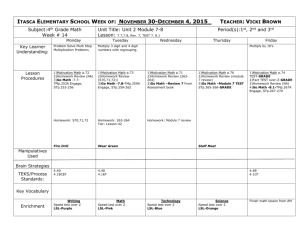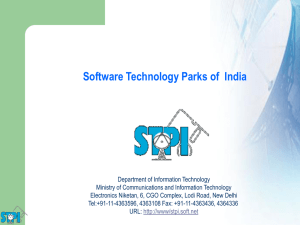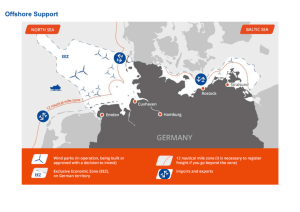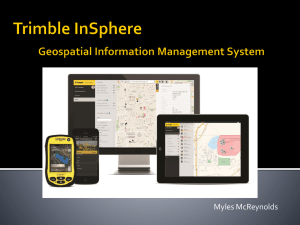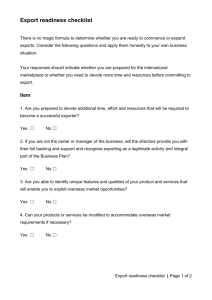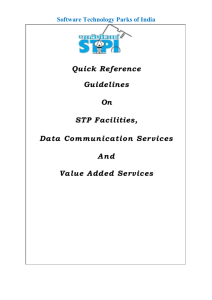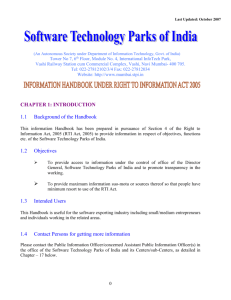Complete Guide to setup a Software Export House
advertisement
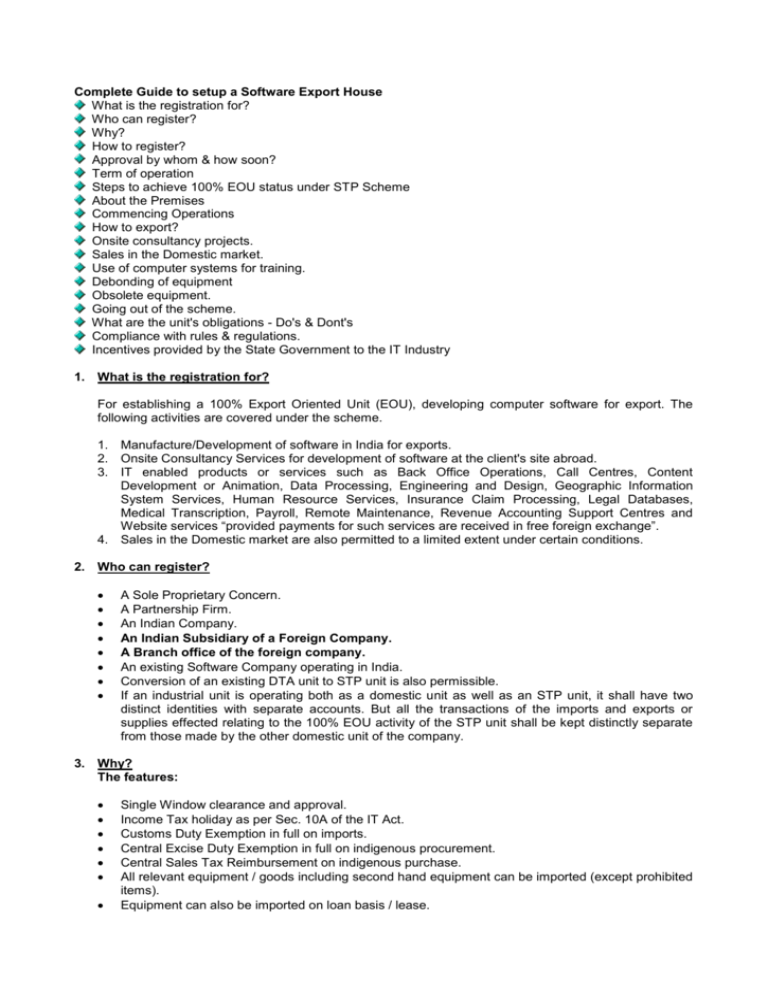
Complete Guide to setup a Software Export House What is the registration for? Who can register? Why? How to register? Approval by whom & how soon? Term of operation Steps to achieve 100% EOU status under STP Scheme About the Premises Commencing Operations How to export? Onsite consultancy projects. Sales in the Domestic market. Use of computer systems for training. Debonding of equipment Obsolete equipment. Going out of the scheme. What are the unit's obligations - Do's & Dont's Compliance with rules & regulations. Incentives provided by the State Government to the IT Industry 1. What is the registration for? For establishing a 100% Export Oriented Unit (EOU), developing computer software for export. The following activities are covered under the scheme. 1. Manufacture/Development of software in India for exports. 2. Onsite Consultancy Services for development of software at the client's site abroad. 3. IT enabled products or services such as Back Office Operations, Call Centres, Content Development or Animation, Data Processing, Engineering and Design, Geographic Information System Services, Human Resource Services, Insurance Claim Processing, Legal Databases, Medical Transcription, Payroll, Remote Maintenance, Revenue Accounting Support Centres and Website services “provided payments for such services are received in free foreign exchange”. 4. Sales in the Domestic market are also permitted to a limited extent under certain conditions. 2. Who can register? A Sole Proprietary Concern. A Partnership Firm. An Indian Company. An Indian Subsidiary of a Foreign Company. A Branch office of the foreign company. An existing Software Company operating in India. Conversion of an existing DTA unit to STP unit is also permissible. If an industrial unit is operating both as a domestic unit as well as an STP unit, it shall have two distinct identities with separate accounts. But all the transactions of the imports and exports or supplies effected relating to the 100% EOU activity of the STP unit shall be kept distinctly separate from those made by the other domestic unit of the company. 3. Why? The features: Single Window clearance and approval. Income Tax holiday as per Sec. 10A of the IT Act. Customs Duty Exemption in full on imports. Central Excise Duty Exemption in full on indigenous procurement. Central Sales Tax Reimbursement on indigenous purchase. All relevant equipment / goods including second hand equipment can be imported (except prohibited items). Equipment can also be imported on loan basis / lease. High Speed Data Communication Link provided for the export of software. No separate Import/Export license required. Green Card enabling priority treatment for Government clearances/other services. 100% foreign equity investment in the companies permissible. Sales in the DTA upto 50% of the FOB value of exports permissible. Use of computer imported for training permissible subject to certain conditions. Depreciation on computers at accelerated rates upto 90% over 5 years is permissible. Computers can be donated after two years of use to recognized non-commercial Educational Institutions/Hospitals without payment of duty. 4. How to register? Submit the following documents to Director STPI. Application in the prescribed form duly signed by the authorized signatory setting the official seal (3 copies need to be submitted) Copy of Boards resolution nominating the authorized signatory. Project report: Justifying the ability of the enterprise as to the potential in manpower expertise, technology segment marketing and customer support arrangements, business plan, type of software development envisaged, profile of Balance Sheet, Profit and Loss a/c, Cash Flow Statement, Profitability Statement, etc. Document evidencing Sole Proprietary concern /Partnership Firm / Company Registration Certificate, Memo of Association, Memo of Articles, Copy of Agreement/MOU/Purchase Order/Letter of Intent with the overseas customer (if any) in support of the business potential. Lease deed/sale deed of the premises. In case of an existing unit: Product line to be specified, copy of the Audited Annual Accounts for the last 2 years to be furnished. D.D for Rs.2500 drawn in favor of STPI 5. Approval by whom and How soon? All applications for registration under the STP Scheme (except those involving foreign investment not covered under the Automatic Route of RBI) meeting the eligibility criteria will be cleared and approval accorded by the Director, STPI within 2 weeks. Foreign Investment under Automatic Route: Foreign investment upto 100% subject to a maximum limit of Rs.600.00 crores in the IT industry is permissible under the Automatic Route of RBI. Such investment should be by actual remittance of money in foreign exchange. Other cases of foreign investment: The application for registration under the STP Scheme, involving foreign investment as under will be processed and approval issued by the Secretariat for Industrial Approvals, EOU Section of the Ministry of Industry & Commerce. Investments exceeding Rs.600.00 crores Acquisition of shares in an existing company by foreign/NRI/OCBs. Where the investment proposed is otherwise than by actual remittance of funds in foreign exchange. 6. Term of operation The period of operation under the scheme is initially for a period of 5 years. This period may be extended to 10 years. After completion of the initial period of 5 years, it is open to the unit either to opt out of the scheme or to continue for another period of 5 years and request made accordingly to STPI. 7. Steps to start operations under the scheme: Upon accord of approval for the 100% EOU the proposed unit has to respond by submitting a willingness letter to abide by the terms and conditions of the approval. Legal agreement to be executed in the prescribed form on Rs.100 stamp paper, duly signed by the authorized signatory. Three-year advance STP service charges has to be deposited with STPI, which will be adjusted after the financial year is over as per the following scale. Upon executing the legal agreement, the unit attains the status of 100% export oriented unit under the STP scheme and it as to fulfill the obligations as set forth in the legal agreement, such as commencement of production with in the stipulated period, fulfillment of export obligations, etc. Export turnover Upto Rs. 25 lakhs Service charges (INR) 8000 Above Rs. 25 lakhs and less than or equal to Rs. 50 lakhs 16,000 Above Rs. 50 lakhs and less than or equal to Rs. 3 Crores 55,000 Above Rs. 3 Crores and less than or equal to Rs. 10 Crores 1,10,000 Above Rs. 10 Crores and less than or equal to Rs. 25 Crores 2,25,000 Above Rs. 25 Crores and less than or equal to Rs. 50 Crores 2,50,000 Above Rs. 50 Crores and less than or equal to Rs. 100 Crores 3,50,000 Above Rs. 100 Crores and less than or equal to Rs. 500 Crores 5,75,000 Above Rs. 500 Crores and less than or equal to Rs. 1000 Crores 6,00,000 Above Rs. 1000 Crores 6,50,000 8. About the Premises IT Software industry is exempted from zoning regulations for the purpose of establishing the industry. Therefore the STP unit can be established in any location. The units can be established in the STPI Complex or in owned or leased accommodation anywhere within the jurisdictional area of the Director, STPI and the Customs Circle and the premises of the unit may be amenable to customs bonding. 9. Commencing Operations For allotment of the Importer/Exporter code, apply in the prescribed form to the D.G.F.T. Furnish to STPI a list (in triplicate) of capital goods to be imported, procured indigenously which are relevant to the manufacture / development of the soft ware undertaken by the unit giving the details such as name of the items, quantity, rate for item, total value, rate of duty, value of duty etc., which are relevant to the manufacturing/development of software. This list will be endorsed by the STPI and given to the unit for filing the same with customs & central Excise. Obtain clearance from STPI for custom bonding license and then apply in the prescribed form to customs & central Excise dept. For private bonded warehouse license. Furnish documents evidencing the owned / leased premises where you propose to carry on the operation of software development together with floor plan of the premises. License is granted in 2 weeks. Furnish a copy of the above license to STPI. If STPI data communication Link is required, apply to STPI in the prescribed form along with deposit of money equivalent to registration fee, installation charges and one quarter tariff. The link will be given in 6 to 8 weeks. For more details please refer to the Data Com tariff structure of STPI. Imports: For import of capital goods which are relevant to the manufacturing /development of software, apply to STPI. In the prescribed form duly enclosing the proforma invoice from the seller, for issue of import certificate. In case of items imported on loan basis, please furnish supporting document to show that they are on loan. Second hand capital goods may also be imported. Leasing of capital goods can be sourced from a Domestic/ foreign leasing company. Import / Indigenous procurement of office equipment permitted upto 20% of the total value of the capital goods installed. Procurement of Indigenous capital Goods: Based on the list of indigenous capital goods endorsed by STPI and submitted to central Excise department, the equipment can be procured free of Excise Duty after obtaining C. T. 3 certificate from Central Excise department 10. How to Export Software developed can be exported through Data communication Link / physical Media or software can be developed at customer site abroad by deputing software professionals of the unit. Export of software developed in India: 1. Through Data Communication Link: As soon as the software is exported using Satellite Data Communication link, a software declaration in the prescribed form called Softex (available at RBI) form has to be submitted duly filled in, in TRIPLICATE to the STPI for clearance along with the following documents. o o o o o Invoice (3 copies) Customer agreement /W.O / P.O Project Details Data transmission details in support of the export of software (in the prescribed form) In cases where data communication link is obtained from a service provider other than STPI, please furnish appropriate documents in support of such connectivity. 2. Physical Media: Obtain GR Form from RBI and submit the same, duly filled in, Along with the customer’s agreement, invoices in duplicate and shipping bills in triplicate to STPI, for clearance. After clearance by STPI, all the documents have to be submitted to Customs for their clearance for export. In case the export is to be made through Postal channel, the PP form, duly filled in and countersigned by the authorized banker, along with the customer’s agreement and invoices have to be submitted to STPI, for clearance. After clearance, the documents should be presented to the Post Office for dispatch. 11. Onsite Consultancy Projects Submit to STPI, application in the prescribed From A (in triplicate) along with copy of Agreement / W.O. / P.O from the customer abroad before deputing the software professionals abroad for development of software. The form will be cleared and signed, one copy being returned to the unit and another to the RBI. After completion of the project or as soon as payment in respect of consultancy services is received, submit to STPI information in the prescribed Form B (in triplicate) along with invoice, and the FIRC. After clearance from STPI a copy of From B will be returned to the unit for submitting the same to the authorized banker. 12. Sales in the Domestic market After the export of the software to the minimum extent (Know as Export Obligation) is achieved for the Financial Year, the unit may obtain from STPI specific permission for sales in the Domestic Tariff Area to the extent of 50% of the value of exports made and money realized. Domestic sales made by the unit for which payment is realised in foreign currency is also treated as export income. Specific approval of STPI has to be obtained for this purpose. Sub-contracting: STP Units may sub-contract part of the work /process through job works on the DTA units or to other EOU/EPZ/EHTP/STP units after obtaining necessary permission from the Assistant Commissioner of Customs. 13. Use of Computer Systems for training STP units may also be allowed to use the computer systems for training purpose (including commercial training) After obtaining necessary approval from the Assistant Commissioner of Customs & Central Excise subject to fulfillment of export obligation and that no computer terminal shall be installed outside the bonded premises for the purpose. 14. Debonding of Equipment If an STP unit is not able to utilize the imported equipment/ goods, it can re – export or dispose them in DTA on payment of applicable duties. 15. Obsolete Equipment May be disposed of in DTA subject to payment of Customs duties on the depreciated value thereto. If such equipment is destroyed with the permission of Asst. Commissioner of customs and central excise, no duty is payable. 16. Going out of the scheme The period of operation for STP units would normally be 5 years. The Director, STP would permit debonding of the STP unit if it has met the export obligation and other conditions of the letter of approval. In case the unit has not fulfilled the export obligation and other conditions of the letter of approval, the case would be forwarded to the DGFT for taking penal action for non fulfillment of the conditions of letter of approval, The units would also be required to pay the customs duties, Central Excise duties and it will also be liable for levy of liquidated damages. 17. What are the Unit's obligations - DO's and DONT's DO's 1. The development / production of the unit under the scheme shall be carried on in a customs bonded area. 2. Commencement of production within the gestation period allowed under the scheme and starting exports. Intimate STPI of the date of commencement of commercial production/exports. If commercial production and exports are not commenced within a period of 3 years from the issue of the letter of approval (LOP) given for the establishment of the unit under the Scheme, the LOP LAPSES automatically after the expiry of the said 3 years. 3. The unit shall be a positive net foreign exchange earner. Positive NFE = A – B > 0 A) is the FOB value of exports by the STP unit and B) is the sum total of the CIF value of all imported inputs and the CIF value of all imported capital goods, and the value of all payments made in foreign exchange by way of commission, royalty, fees, dividends, interest on external borrowings during the first five year period of any other charges. “INPUTS” mean raw materials, intermediates, components, consumables, parts and packing materials. 4. The unit shall realize the amounts due for the exports made within 180 days from the date of export, or the due date under the contract, whichever is earlier. 5. If the unit fails to fulfill the export and other obligations under the scheme, it will be liable to pay the customs duty and excise duty on the goods procured and such other penalties and liquidated damages as may be decided by the Government. 6. In case external commercial borrowings are resorted to, necessary permission from Ministry of finance to be obtained. 7. In case of import of US controlled items, please comply with the relevant provision vide S.No.9 of the standard condition attached to the letter of approval for 100% EOU. 8. Maintain separate accounts for the operation under the scheme. 9. Maintain prescribed records and document. 10. Apply to STPI for clearance in the following cases: o o o o o o o o o o o o For any change of address, change of name or constitution of the unit. For extension of premises for carrying out the operation. For shifting of equipment from the bonded warehouse for repairs, temporary transfer, permanent transfer, inter-unit transfer, disposal, etc. For exporting the imported equipment for repairs / replacement. For re-export of equipment imported on loan basis. For enhancing the limit of capital goods to be imported. For obtaining permission for sales in DTA. For debonding of the equipment / debonding of the unit. For reimbursement of CST. For sale of imported capital goods and materials. For disposal of obsolete equipment. For donation of obsolete equipment. 11. Pay the dues to STPI on time. 12. Submit the Quarterly / Annual performance reports in the prescribed form, on time. DONT's 1. Please do not utilize the equipment procured duty free for any activity not covered under the scheme. 2. Please do not carry on any operation not covered under the scheme in the customs bonded warehouse premises. 3. Data circuit is meant exclusively for the purpose of transmission of data between two designated locations and sub-lease to any company or re-engineering to any other location is strictly prohibited. 4. Data circuit should not be used for voice purpose on PSTN, as per the Indian Telecommunications Act. 18. Compliance with rules & regulations The various steps / Procedures / requirement enumerated above are as per the relevant Provisions in the rules and regulations mentioned below and the same have to be complied with by the units. 1. The STP scheme and the terms and conditions given in the 100% EOU approval letter and the annexure thereto and the legal agreement. 2. Provision in the Import / Export policy and procedures, the Foreign Trade Regulation Act, Customs & Central Excise Regulation and any other Government rules / instructions, Orders of STPI etc. As may be applicable. 19. Custom Bonding Custom Bonding of the premises is not mandatory for the IT/ITES industries as per the new guide lines. 20. Incentives provided by the State Government to the IT/ITES Industries may be available as per policy . SO, GET, SET, AND GO…
